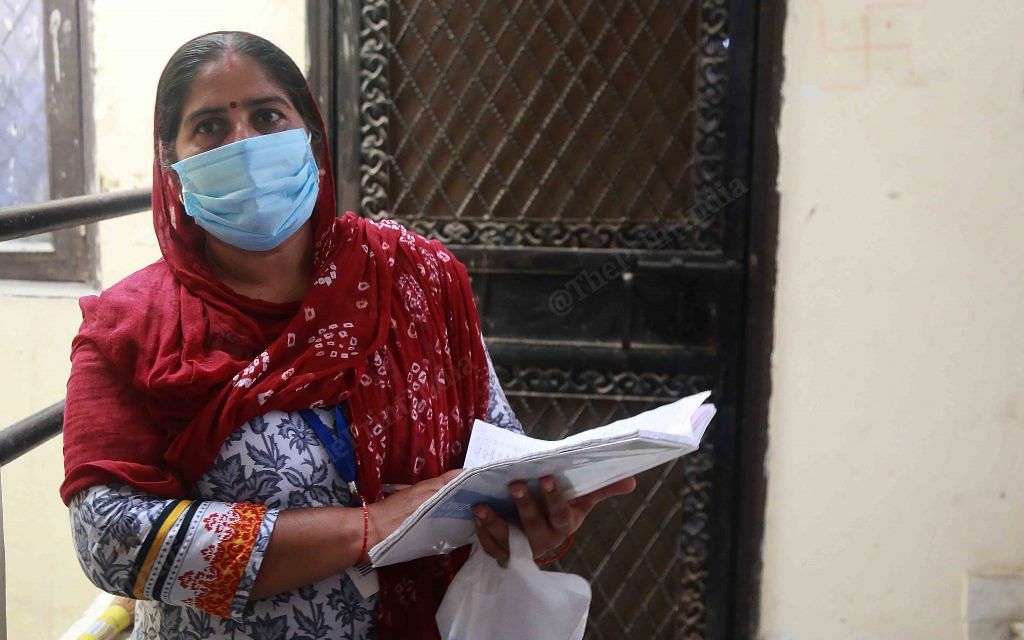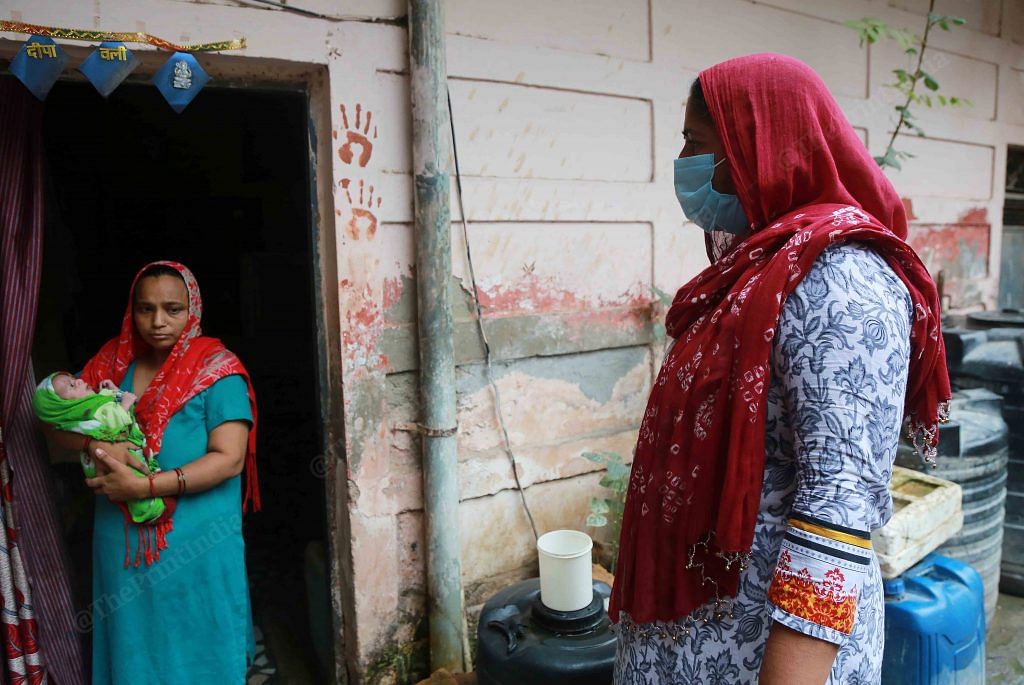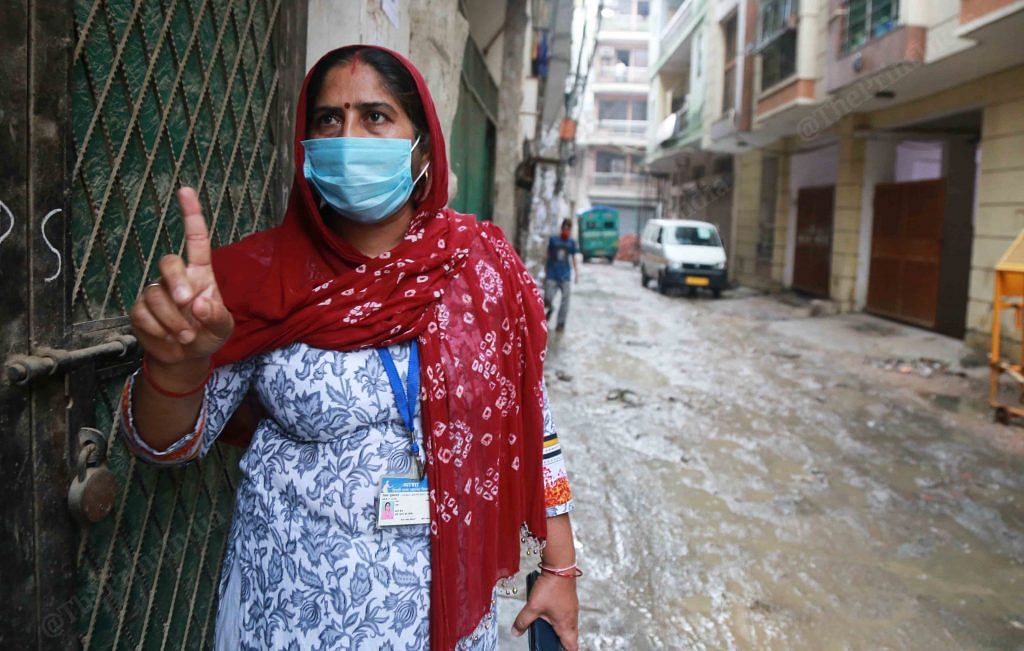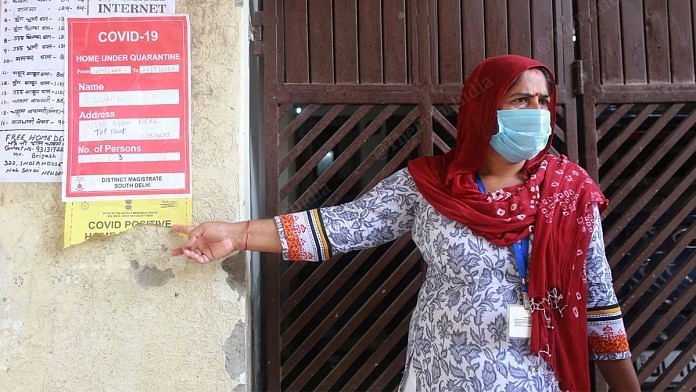New Delhi: For 42-year-old Rekha Balhara, an Accredited Social Health Activist (ASHA) worker in Delhi’s Neb Sarai area, the day begins at 4:30 am. After her morning chores, she leaves her small house in the area — where she resides with her family of seven — and begins her inspection on foot anywhere between 8 am to 10 am.
Balhara covers over 400 households with more than 2,000 individuals. However, the Covid-19 pandemic has made her daily work even more rigorous, especially since the Neb Sarai area was a containment zone until 22 June.
ASHA workers were recruited under the National Rural Health Mission (NHRM) launched in 2005. They act as bridges between the public healthcare and the community and are usually tasked with antenatal and newborn babies’ care, encouraging immunisation, family planning and treating basic illnesses.
There are almost 9 lakh ASHA workers in the entire country, and in this pandemic, they have proved to be extremely important as frontline Covid warriors.
According to Balhara, in addition to her usual work, she has to track Covid patients, check people with possible symptoms, cordon off areas that have more cases and keep apace with families under home quarantine. “Since the pandemic, our work has quadrupled,” she said.
“In my nine years of working as an ASHA worker, nothing helped me prepare for the coronavirus pandemic.”
While Balhara continues to extend prenatal services, immunisations for newborn babies and regular checkups for senior citizens, she admits that the usual medical services have taken a backseat due to Covid-19.
“However, we still go door-to-door and do checkups on new-born babies and their mothers, to ensure that women get enough nutrition during their pregnancy and follow up on babies 45 days after their birth. Sometimes we get calls in the middle of the night and we go. My work starts at around 8:00 am and goes on till anywhere between 2:30-6:00 pm.” Sometimes, she gets delayed starting her day, but is out on the streets no late than 10am.
Despite the increase in work, Balhara said the aid extended by the government has been disproportionate. She noted that even though ASHA workers are in constant contact with Covid-19 patients, they have not been provided with PPEs, forcing them to fend for themselves.
“Since the beginning of the pandemic, all the government has given us is one N95 mask and one set of gloves. I also need to stay safe and take care of myself as I have a family, therefore I bought my own set of masks, gloves and sanitisers,” she stated.

Also read: Rude customers, long hours, PPE in Delhi heat: A day in life of frontline Covid paramedics
‘Come rain, hail — my work will not stop’
The apathy of the government has not deterred Balhara from carrying out her work.
To prepare herself for a long day of work, she takes calcium, zinc and Vitamin C tablets in the morning before setting out with her Covid register in a small bag, head cloaked in a dupatta, and her masks and gloves securely in place.
Balhara surveys anywhere between 30-50 households in a day. She is part of a WhatsApp group with other ASHA workers and an auxiliary nurse midwife (ANM), who sends out a list of Covid-19 patients in the area.
As she goes door-to-door checking up on people to ensure that nobody has any Covid symptoms, people instantly recognise her and begin asking for advice, even inviting her in for a cup of tea. However, Balhara is very particular about social distancing and firmly refuses them with a warm smile.
The houses in Neb Sarai are closely stacked together. With narrow lanes and a poor drainage system, at times the ASHA worker has to wade through knee-deep water to complete her duties.
But she continues on, dedicated to the people that have come to rely on her unquestioningly. “Come rain, hail, snow — my work cannot stop. There are people who rely on me.”
What she is worried about, however, are the diseases that the water-clogged lanes carry. She notes that she is at great risk of dengue, diarrhoea and other diseases, which can prove fatal to the people she visits.
To counter this, in the middle of the day, Balhara goes back home to discard her wet and germ-ridden clothes. She also disposes off her masks and gloves as well and puts on a fresh set before setting off again.
“I have a bath nearly four times a day,” she said.

Also read: Bengaluru Covid bed shortage isn’t about availability but hospitals flouting rules, says govt
Anger at the government for meagre salary, no PPEs
While Balhara finds her job as an ASHA worker, where she gets to help people, extremely fulfilling, she is also angry at the Delhi government for not providing them with the adequate protective equipment.
“We go to Covid patients’ houses, check their temperature and breathing through an oximeter and we have no PPE kits. I have to wear two masks and two gloves and wrap my head with a dupatta three times over to maintain safety. Even the register and pen I have has been bought by me,” she said.
Balhara is not the only one who is angry at the government. In the past few weeks, ASHA workers across the country have risen in protest against the lack of resources and meagre salaries.
In Karnataka, almost 40,000 ASHA workers have been under strike for over 10 days now demanding a raise and better protective gear.
Similarly, in Punjab’s Kartarpur, about 162 ASHA workers are protesting, demanding remunerations as well as PPEs to carry out their duties safely.
Even the Delhi Asha Workers’ Association (DAWA), the union Balhara is a part of, went on strike on 21 July to demand safety equipment and higher pay.
A Delhi government official told ThePrint that ASHA workers are usually picked and recruited from the community itself and instead of getting a salary, they are given an honorarium.
In April 2020, the central government announced an incentive of Rs 1,000 per month for ASHA workers carrying out Covid duties. However, according to Balhara, the amount is not enough.
She pointed out that a normal sanitation worker earns approximately Rs 750 a day, yet an ASHA worker, who has extensive Covid duties to juggle now, gets only Rs 1,000 per month.
“The Rs 1,000 doesn’t even cover my expenses for masks, sanitiser and gloves. We are also people with families and get scared but someone needs to do this job. The government needs to provide at least the most basic safety equipment,” she said.
Balhara said that she works overtime and manages to earn about Rs 5,000-6,000 per month with great difficulty. Her basic salary, otherwise, is Rs 4,000 per month.

A senior official in the Delhi’s health department, who did not wish to be named, told ThePrint that ASHA workers were given equipment according to their work. He added that the Program Officer was now looking into providing more safety equipment to them.
Despite all this, Balhara and other ASHA workers have continued to work relentlessly.
“I am a part of this community. If I stop working tomorrow then what face will I show my people when I resume work and they tell me you weren’t there for us when we needed you,” Balhara said.
Several of her colleagues plan to protest outside the Health and Family Welfare Department office in Civil Lines on 27 July, but Balhara doubts she will attend it.
“There is too much work. I can’t just go and not show up one day. There are people relying on me.”
Also read: What coronavirus pandemic reveals about the pay gap between frontline workers



